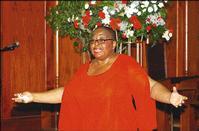
Ms. June Patricia Bennet performs at her debut song recital, 'An Evening of Music' held last Sunday at the University of the West Indies Chapel, Mona. Part proceeds were in aid of the Wortley Home. WINSTON SILL/ Freelance Photographer
Tanya Batson-Savage - Freelance Writer
IF ONE were to take the Steven de Souza model or at least follow his advice it seems that breaking into Hollywood is as easy as potato pudding.
The screenwriter, director and producer engaged in a session of reasoning with some of Jamaica's film and television community on Sunday morning at the Hilton Kingston Hotel, New Kingston.
The session produced advice about screenwriting, as well as steps the local film industry needs to take to make an international impact. The 'Film and Television Reasoning' was a part of the Doctor Bird awards 2004 for which de Souza is this year's Life Time Achievement award recipient. The fourth staging of the biennial award ceremony will take place today at the Palace Cineplex where one of de Souza's films, Possessed, will be screened.
DESOUZA'S EXPERIENCE
De Souza's pen has lent its skill to television shows like Knight Rider, Six Million Dollar Man, 48 Hours, Die Hard, and Lara Croft Tomb Raider: The Cradle of Life.
"The easiest way to break into Hollywood is as a writer, because all you need is a paper and a pencil, well now you need a computer," he told the attentive audience. It was the route he had taken when during the 1970s he went to Hollywood armed with two 'spec' scripts. Within days he had earned his first job as a television writer.
De Souza explained that when creating a sample of work, the first 10 minutes are what is important, whether those ten minutes are a script or a short film. "If they can't tell that you are a good writer in 10 minutes, they're not going to read to 100 pages," he said.
Spurred by the questions from the floor, de Souza went on to talk about the importance of having standing sets and sound stages. "The first choice of television is standing sets, then it's the back lot, and the final choice is the real world," he explained. According to de Souza, in his ideal world as a producer he would never go outdoors for a television show. He also noted that the same should apply for a big budget movie. "If you see you have a list of 25 locations, make that 18 locations," he advised.
SOUND STAGES
It is based on that concept of producing that de Souza advised
that Jamaica's avenue for breaking into the film and television market is by
building state-of-the-art sound stages, and a back lot. De Souza argued that
Hollywood is always on the lookout for English speaking locations with cheap
labour. In an earlier interview with The Gleaner he had asserted that
should Hollywood fall off the map there would simply be an all
points bulletin for '500 German tourists' rather than the film industry.
According to de Souza, currently Jamaica offered its scenery
for film production but that most of the work would be done in a studio so the
country does not benefit from most of the work.
TAX INCENTIVES
He noted, however, that, even when it comes to scenery Jamaica
needs to sell it self with the places that do not look like Jamaica.
De Souza brought back a point which the local industry players
have been trying to get across for years, that the venture needs government
support by way of offering tax incentives to investors in the industry.
He noted that Singapore, Australia, New Mexico and Canada all
had models which Jamaica could pattern.
De Souza pointed out that he had made movies in many countries,
so "why not Jamaica?" It is a question that only time, and maybe tax incentives,
can answer.














